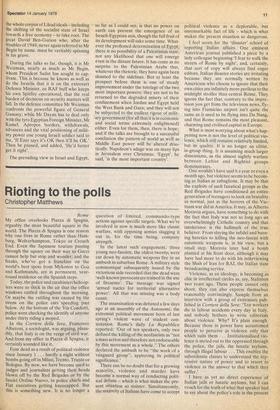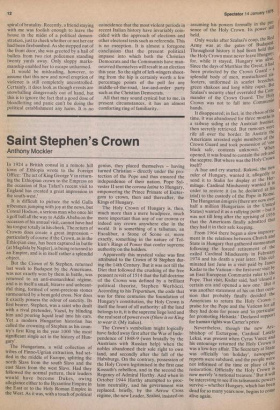Rioting to the polls
Christopher Matthews
Rome My office overlooks Piazza di Spagna, arguably the most beautiful square in the world. The Piazza di Spagna is one reason Why one lives in Rome rather than Hamburg, Wolverhampton, Tokyo or Crouch End. Even the Japanese tourists passing through the square on their way to Gucci cannot help but stop and wonder, and the freaks, who've got a franchise on the world's best spots from Mykonos to Goa and Kathmandu, are in permanent, yearround residence on the Spanish steps.
Today, the police and carabinieri helicopters were so thick in the air that the office windows rattled throughout the morning. Or maybe the rattling was caused by the sirens on the police cars speeding past below. At the bottom of the Via Condotti, police were checking the identify of anyone under thirty riding a moped.
In the Corriere della Sera, Francesco Alberoni, a sociologist, was arguing, plausibly, that Italy is on the verge of civil war. And from my office in Piazza di Spagna, it certainly sounded like it.
Four dead as a result of political violence since January 1 . . . hardly a night without bombs going off in Milan, Trento, Trieste or Bologna. By now, we have become used to judges and journalists getting their heads blown off by the Red Brigades or by the fascist Ordine Nuovo, to police chiefs and Fiat executives getting kneecapped. But this is something new. It is no longer a question of limited, commando-type actions against specific targets. What we're involved in now is much more like classic warfare, with opposing armies slugging it out in, for the time being, company strength.
In the latest such engagement, three young neo-fascists, the oldest twenty % were cut down by automatic weapons fire in an ambush in suburban Rome. A military style communique subsequently issued by the victorious side recorded that the dead were 'well-known provocateurs trained in the use of firearms'. The message was signed 'armed nuclei for territorial alternative power'. All that was missing was a body count.
The assassination was debated a few days ago at an assembly of the Auionomi, the extremist political movement born of last spring's violent wave of student contestation. Rome's daily La Repubblica reported: 'Out of ten speakers, only two defined the killing of the neofascists as "not a mass action and therefore not endorseable by this movement as a whole." The others declared the ambush to be "the work of a vanguard group", approving its political significance.'
There can be no doubt that for a growing minority, violence and murder have become a normal way of conducting political debate — which is what makes the present situation so sinister. Simultaneously, the majority of Italians have come to accept political violence as a deplorable, but unremarkable fact of life — which is What makes the present situation so dangerous.
I feel scorn for the 'disaster' school of reporting Italian affairs. One eminent American journal published a piece by a lady colleague beginning 'I fear to walk the streets of Rome by night', and, certainly, that sort of copy will always find eager editors. Italian disaster stories are irritating because they are normally written by Americans who choose to ignore that their own cities are infinitely more perilous to the midnight stroller than central Rome. They ignore the fact that, contrary to the impression you get from the television news, flying into Fiumicino airport isn't quite the same as it used to be flying into Da Nang, and that Rome remains the most pleasant, charming and civilised capital in Europe.
What is most worrying about what's happening now is not the level of political violence, which still remains relatively limited, but its quality. It is no longer an elitist, in-group thing. It is assuming much larger dimensions, as the almost nightly warfare between Leftist and Rightist groups demonstrates.
One wouldn't have said it a year or even a month ago, but violence seems to be becoming as Italian as zabaglione. It may be that the exploits of such fanatical groups as the Red Brigades have conditioned an entire generation of teenagers to look on brutality as normal, just as the horrors of the Vietnam war did in America. It may, as Alberto Moravia argues, have something to do with the fact that Italy was not so long ago an overwhelmingly Catholic country and that intolerance is the hallmark of the true believer. From slaying the infidel and burning heretics to killing the neo-fascist with automatic weapons is, in his view, but a small step. Moravia later had a bomb planted at his front door, although it may have had more to do with his interviewing the Shah of Iran for RAI, the Italian state broadcasting service.
Violence, as an ideology, is becoming as chic in intellectual circles as, say, Stalinism two years ago. These people cannot only shoot, they can also express themselves reasonably convincingly. Sample from an interview with a group of extremists published in Corriere della Sera: 'Ten workers die in labour accidents every day in Italy, and nobody bothers to write editorials about violence. Why? It's plain enough.
Because those in power have accustomed people to perceive s violence only that which suits them . Institutionalised .vio lence is meted out to the oppressed through the police, the jails, the lunatic asylums, through illegal labour . . . This enables the subordinate classes to understand the repressive nature of power and to resort to violence as the answer to that which they suffer.'
I have as yet no direct experience of Italian jails or lunatic asylums, but I can vouch for the truth of what that speaker had to say about the police's role in the present spiral of brutality. Recently, a friend staying with me was foolish enough to leave the house in the midst of a political demonstration, just to check whether or not her car had been firebombed. As she stepped out of the front door, she was greeted by a hail of bullets from two riot policemen standing twenty yards away. Only sloppy marksmanship enabled her to escape unharmed.
It would be misleading, however, to assume that this new and novel eruption of violence is still completely uncontrolled. Certainly, it does look as though events are snowballing dangerously out of hand, but this is to ignore the fact that a good dose of bloodletting and panic can't be doing the political establishment any harm. It is no coincidence that the most violent periods in recent Italian history have invariably coincided with the approach of elections and other electoral tests such as referenda. This is no exception. It is almost a foregone conclusion that the present political impasse into which both the Christian Democrats and the Communists have manoeuvred themselves will result in an election this year. So the sight of left-wingers shooting from the hip is certainly worth a few percentage points of the poll for any middle-of-the-road, law-and-order party such as the Christian Democrats.
All that may sound cynical but to me, in present circumstances, it has an almost comforting ring of familiarity.































 Previous page
Previous page